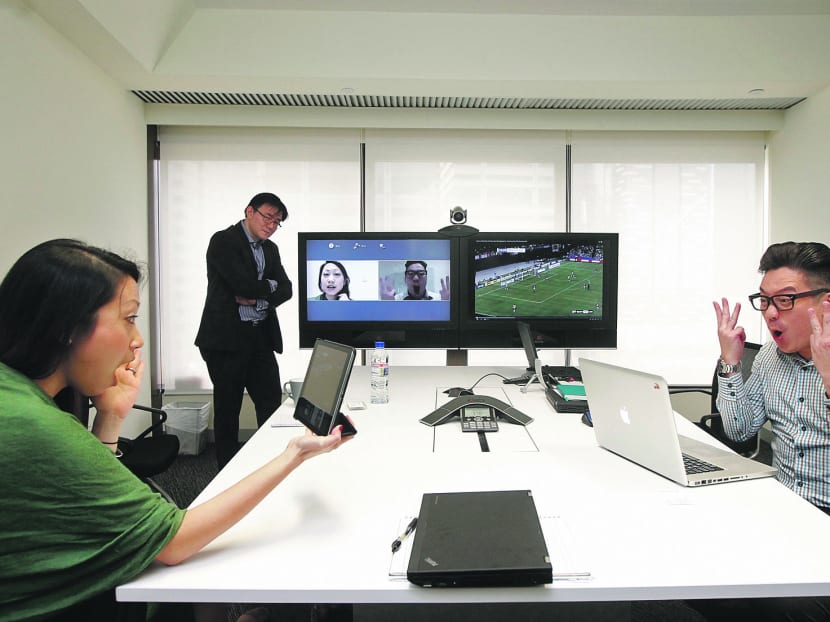Firms play it smart during World Cup
SINGAPORE — Bleary-eyed, sleep-deprived football fans may be the norm during the Brazil World Cup, with many here suffering the ill effects of having to catch the action in the wee hours of the morning due to the time difference. But senior marketing specialist Cammie Cheng is looking no worse for wear despite watching an average of five matches a week and staying up to cheer on her favourite Dutch player, Robin van Persie.

(From left) Polycom staff Cammie Cheng, Eric Wong, and Moses Lim. The firm has adopted a flexi-work hours policy that allows staff to balance their World Cup viewings with work effectively. PHOTO: Wee Teck Hian
SINGAPORE — Bleary-eyed, sleep-deprived football fans may be the norm during the Brazil World Cup, with many here suffering the ill effects of having to catch the action in the wee hours of the morning due to the time difference. But senior marketing specialist Cammie Cheng is looking no worse for wear despite watching an average of five matches a week and staying up to cheer on her favourite Dutch player, Robin van Persie.
There is no secret formula that keeps Cheng and her colleagues awake and fresh at work. Her employer, voice and video solutions company Polycom, is one of the firms here that have adopted a flexi-work-hours policy that allows staff to balance their World Cup viewings with work effectively.
Polycom employees are able to use the company’s app to log on to video conference meetings with their customers or colleagues using their smartphones, tablets or computers wherever they are.
“My friends always ask me how I can still work! I sleep early and wake up at midnight to catch the matches … sometimes I watch two matches in the morning and at 8am I do my video conference calls from home and come into the office after 11am or 12pm,” said Netherlands fan Cheng, also a Manchester United supporter. “With these flexi hours, we are able to do the video conference calls anywhere with colleagues and business partners and it doesn’t affect work productivity.”
Polycom technical sales manager Moses Lim added: “If I’m not involved in a customer meeting, I will stay up late and come in later to the office. I try to schedule the matches around meetings, but if not, customers come first.”
Eric Wong, Polycom’s head of talent acquisition, said the company’s focus is on achieving business goals, not time spent in the office. He explained: “This helps keep staff engaged … they don’t need to clock face time as every employee has got their goals set up. These are very detailed and they know what to do.”
Other companies, such as Sentosa Development Corporation, Manulife Singapore and KPMG Singapore, have also been caught up in World Cup fever, with some offering flexi-working arrangements, and others arranging match screenings in the company clubhouse, especially during the earlier, match-packed weeks of the tournament.
British banking and financial services firm Barclays has been allowing flexi-work arrangements for about 3,500 staff in Singapore. Vice-president, corporate communications, South-east Asia, John McGuinness said the bank accommodated requests to vary working time around games wherever possible, “while recognising that our service to customers and clients must come first”. “Barclays encouraged managers, where appropriate, to consider allowing greater access to games/results, with temporary flexible arrangements, and also to look at holiday requests positively if business needs can continue to be met with remaining staff,” he said.
Some staff at Sentosa Development Corporation have signed up via the recreation club for a special private screening of the World Cup final on July 14 at Universal Studios Singapore. Organisers have extended some tickets to Sentosa staff at a special rate, which will allow admission to selected rides and shows from 7.30pm, pre-match entertainment, World Cup “live” screening at WaterWorld and free flow of beer during the game.
Cynthia Lee, Sentosa Development Corporation’s divisional director, human resources, told TODAY that the firm is “committed to cultivating an engaged workforce and building a fun culture at work”. While media reports have emerged from other countries about staff buying medical certificates (MCs) online or calling in sick in order to catch the World Cup, those that TODAY spoke to said the practice is not widespread here.
“With a staff strength of about 1,000, which consists of varying age groups with different interests,” Lee added, “there is little impact of the World Cup season on productivity and we have seen passionate fans who are able to pace themselves as they enjoy the matches.”
Linda Teo, country manager of multinational human resources consulting firm ManpowerGroup Singapore, told TODAY that employees here are “generally responsible and would not want their personal interests to affect their work performances” during the World Cup. She said: “Most employees would request to take time off or annual leave to watch the matches at home. There is, however, a small minority who will take sick leave when their leave requests are rejected or when they do not have sufficient leave balance.
“Some employers allow a certain amount of flexibility such as staggering working hours so long as business operations and employee’s work performance are not compromised. Employers are generally more tolerant over such one-off requests as the World Cup happens only once every four years.”





